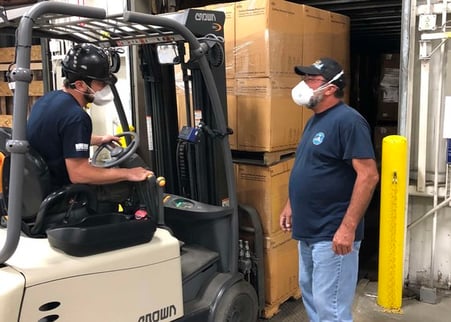Low-code/no-code platforms help manufacturers improve manufacturing quality, supply chains, warehousing, staffing and harnessing IIoT data.
 Low-code/no-code solutions have traditionally been ignored by manufacturers. There are plenty of reasons for this. But one of them is the unique nature of Industrial IoT (IIoT) solutions that drive modern manufacturing.
Low-code/no-code solutions have traditionally been ignored by manufacturers. There are plenty of reasons for this. But one of them is the unique nature of Industrial IoT (IIoT) solutions that drive modern manufacturing.
according to the DevPro Journal article, “How Low-Code is Transforming Manufacturing: What Devs Need to Know”:
“The capital-intensive nature of industrial IoT (IIoT) solutions creates barriers to entry, and to changing course once set. Additionally, the IIoT is dominated by single-vendor solutions: a one-stop-shop providing IIoT sensors that also provide the associated management platform and all the rest. The result is intractable vendor lock-in that hinders manufacturers’ flexibility.”
However, that’s starting to change. The reason is straightforward: The platforms offer substantial benefits for manufacturers. DevPro Journal puts it this way:
“Low-code development is driving a paradigm shift in the industry, serving as the connecting hook that enables flexibly-designed solution ecosystems for innovation now and for whatever comes next. Low-code development abstracts complex and powerful IIoT, AI/ML, big data, and other capabilities into easy-to-assemble modules within drag-and-drop interfaces. These environments truncate the time, resources, and (expensive) expertise required to develop the advanced applications that manufacturers need to stay competitive. With low-code, manufacturers can escape vendor lock-in and straddle technology silos, while increasing productivity and accelerating their time-to-market with new solutions.”
Given all that, there’s been a strengthening movement toward use of the platforms. Low-code/no-code offers considerable benefits in multiple ways. But these are among the most important:
 Improving Quality
Improving Quality
Understanding manufacturing quality requires careful inspection of products, recording defects, identifying material issues and more. Using low-code or no-code apps for quality inspections allows companies to collect faster, richer data. They can then analyze the information quickly and more thoroughly using dashboards or data visualization. More accurate data can even be used for predictive analytics, helping companies understand - in advance - when equipment should be serviced or if there is a potential material shortage.
 Managing Supply Chains
Managing Supply Chains
The pandemic has wreaked havoc with supply chains in all industries. But it’s hit manufacturing particularly hard. Low-code/no-code can help. With the platforms, manufacturers can quickly create applications that track materials through every step of the acquisition and manufacturing process. And the apps can also do more than just track materials. They can also validate them and check for quality. The DevPro Journal article supports this strength, saying, “Low-code allows manufacturers to quickly set up workflows for manufacturing line validation processes, and then to iterate swiftly on those workflows as needed.”
 Efficient Warehousing
Efficient Warehousing
One of the superpowers of low-code/no-code in manufacturing is the ability to create apps to improve warehousing and inventory. These apps can identify every piece of raw material and every piece of manufactured goods and know exactly where they are at any time. The apps make it easy for workers to use cell phones or tablets to instantly scan bar codes and record time/date stamps so manufacturers know exactly when materials arrive in and depart from facilities.
Harnessing IIoT Sensor Data
 Sensors are at the heart of Industry 4.0 and smart manufacturing. But merely sensing information isn’t the point. That information needs to be turned into actionable data. That’s where low-code/no-code shines. DevPro Journal also sees value in using low-code software in this area, saying that these solutions "can serve as an IoT hub, pulling data from sensors, performing analysis, and running ML models to provide services and actionable insights.”
Sensors are at the heart of Industry 4.0 and smart manufacturing. But merely sensing information isn’t the point. That information needs to be turned into actionable data. That’s where low-code/no-code shines. DevPro Journal also sees value in using low-code software in this area, saying that these solutions "can serve as an IoT hub, pulling data from sensors, performing analysis, and running ML models to provide services and actionable insights.”
Combating Labor Shortages
 Manufacturers are operating in an environment of high-priced and hard-to-find labor. They must find ways to interest younger workers in manufacturing jobs, or find ways to help existing employees get more work done during the workday. Innovative apps built with low-code software is a means to accomplish both. Millennials will want to work with companies offering software that allows them to solve problems on their own, and existing workers can streamline daily tasks. Low-code and no-code apps do both.
Manufacturers are operating in an environment of high-priced and hard-to-find labor. They must find ways to interest younger workers in manufacturing jobs, or find ways to help existing employees get more work done during the workday. Innovative apps built with low-code software is a means to accomplish both. Millennials will want to work with companies offering software that allows them to solve problems on their own, and existing workers can streamline daily tasks. Low-code and no-code apps do both.
The Ideal Low-Code/No-Code Platform for Manufacturers
Alpha Software helps resource-constrained manufacturers digitally transform their businesses.
quality management software helps quality, inventory or production teams utilize the latest mobile features (photos, GPS, time/date stamping, bar code scanning, voice recording, etc.) on smartphones or tablets for fast, accurate data capture on the manufacturing floor or in the warehouse. A built-in analytics engine generates dashboards for tracking KPIs or drilling into data for fast insights or root-cause analysis. Alpha Software customers benefit from free pre-built apps, like the Gemba walk template, 5S Audit template, equipment inspection template and non-conformance report template that can be customized quickly for their organization.
Book a meeting with us to learn how we can help your organization.







Comment